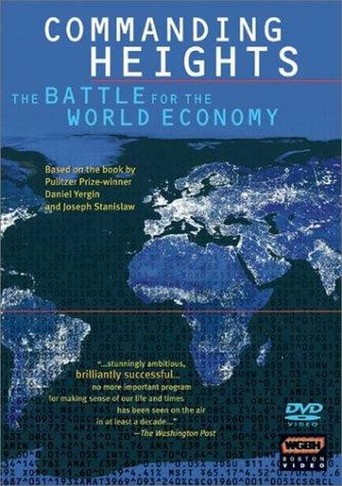



A Disappointing Continuation
Instead, you get a movie that's enjoyable enough, but leaves you feeling like it could have been much, much more.
View MoreExcellent characters with emotional depth. My wife, daughter and granddaughter all enjoyed it...and me, too! Very good movie! You won't be disappointed.
View MoreThe movie's not perfect, but it sticks the landing of its message. It was engaging - thrilling at times - and I personally thought it was a great time.
View MoreThere are so many errors in this documentary it should be categorized as fiction. I am writing this from Greece and the line about Greece and dictatorships is totally misleading. There was for a short period a terrible time when the military junta was in power, but it is important to remember the junta was initiated by Kissinger and supported by the USA. The script is quite muddled because it seems quotes from those appearing in the film have been clipped in order to present the view of the authors. Too much emphasis was on congratulating economists for the prizes they have won rather than offering new analysis on the issues. A range of views was not available in the documentary. The other flaws are too numerous to list. The book has even more.
View MoreOne thing notable about this movie is a remarkable collection of interviews with a number of international textbook economists, shadow politicians, and powerful tycoons. Take Dr Milton Friedman for example. What other popular presentation would boast 20 plus minutes of footage of this iconic economist? But leaving the entertaining visual impact of headshots of the smart, the rich and the powerful, there's not much else positive to say about this 6 hour film which is as ridiculously long as it is ridiculously fictitious. The thesis of the movie can be summarised as "the only economic system which guarantees long term economic prosperity and political stability is free market". This controversial claim has never been settled in the academic circles, see http://en.wikipedia.org/wiki/Criticism_of_capitalism#Market_failures for example. So, it is no surprise that the inherent weakness of the thesis invites the extensive use of *weaker forms of arguments* to advance their position including (a) omission or downplaying historic facts contradicting the thesis (e.g. the Nazi Germany was a free market economy, the Great Depression happened under free market conditions, the communist USSR had marginal poverty rates while the free market USA never went down past double digits), (b) failure to mention more plausible explanations of surveyed historic events (e.g. the dramatic fall in prices for copper, the major source of income for Chile, and the CIA efforts in destabilising the political situation during the Salvador Allende term), (c) trivialization (e.g. the suggestion that the visit of a *free-market revolutionary* Margaret Thatcher to Poland in 1989 ultimately led to Poland independence),(d) false claims (e.g. removing price controls in India resulted in less red tape)(e) fantasies (e.g. a Soviet defector who finally revealed to the West that the USSR was economically doomed was illegally transported across the boarder by two British individuals in a car boot)(d) claims lacking substantiation / causal explanation (e.g. the Polish shock therapy worked while the Russian did not despite similar political situation) (g) conflating ideas (e.g. balancing the budget in Bolivia which brought economic stability had nothing to do with the movie's thesis)(h) conclusions which do not follow (e.g. the Russian financial crisis 1998 gave the country the second chance)So although the movie fails in presenting a coherent logical support for the thesis, it also succeeds remarkably (according to its IMDb ratings) in persuading the uninformed viewers that free markets and resulting globalisation is the only panacea for economic and political ailment. In fact the movies is so bad, it could be a class-room case study of successful public indoctrination. Summary: avoid unless you are in the process of writing an essay on corporate/government propaganda.
View MoreMany scenes of processions of limousines coursing through the darkened streets of capitals around the world. Deeply informative nonetheless.The scene of drowning chicks in the aftermath of the August 15, 1971 wage-price freeze is specious. This propaganda did not originate in this film - the film repeats it as it was originally presented.But finding the males (roosters) among the hatchlings is an at-least-annual exercise in chicken farms everywhere. Since they don't lay eggs or produce the most-marketable meat, over 99% of the males identified fresh out of the egg are drowned (about 50% of the brood, of course). This routine activity was filmed and promoted at the time to publicize a reaction by poultry producers that they did not, in effect, make. Its presentation was pure spin.
View MoreI feel that this is one of, if not the, best documentary I have watched. As an introduction to the political economy, poverty and globalisation, it is a must-watch for anyone who is interested in current events, or is entering university/college doing anything in economics, international affairs or politics. The reason why this documentary is so good - apart from the production quality, huge amount of interviewees - is that it takes at times complex economic arguments and policies and boils them down in such a way that anyone can understand the concepts. While it is a rather large documentary, it is well-worth the look for anyone who has an interest in contemporary affairs.
View More